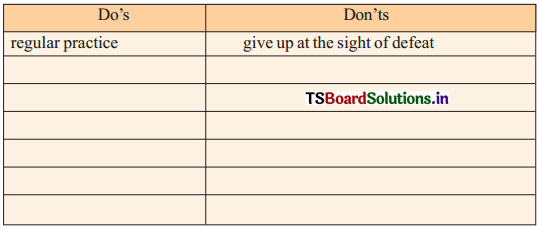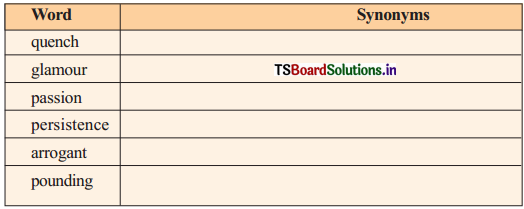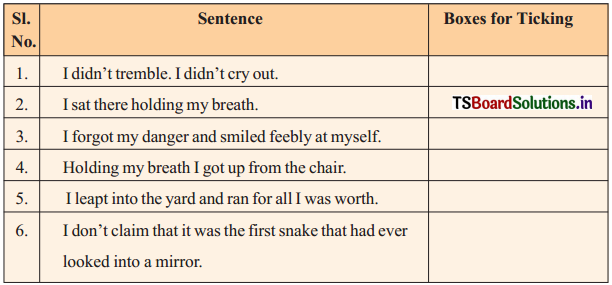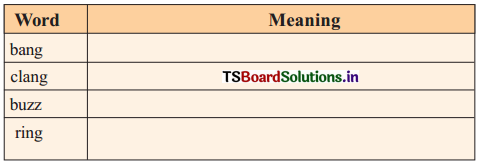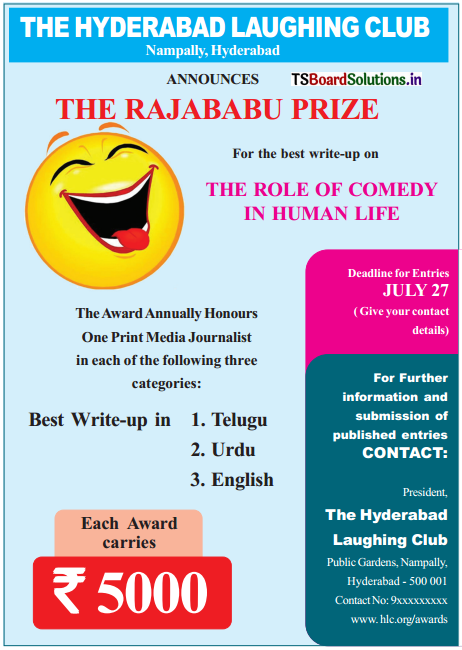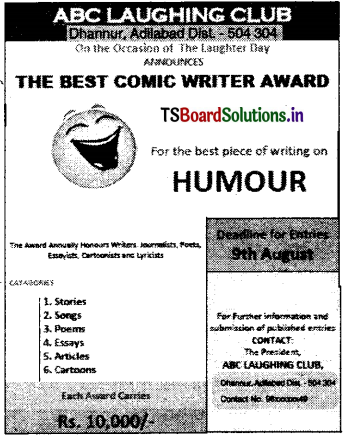Telangana SCERT 9th Class English Guide Pdf Telangana Unit 2C V.V.S. Laxman, Very Very Special Textbook Questions and Answers.
TS 9th Class English Guide Unit 2C V.V.S. Laxman, Very Very Special
Questions and Answers:
Answer the following questions.
Question 1.
What is Laxman’s philosophy of life as per the interview you have read?
Answer:
Laxman’s philosophy of life is to treat success and failure on the same wavelength. Success and failure are parts of anybody’s life. The key is self-belief and performing consistently in tough conditions.
Question 2.
What role did Laxman play in making India, No. 1 test cricket team?
Answer:
V.V. Laxman was part of the fabulous batting line -up which helped India become the No. ITest team. He made 281 runs against Aussies in Kolkata in 2001. It was the most memorable match for him. That was the most memorable series for all the players as it gave them confidence that they can become the best team in the world. It was the turning point of Indian cricket. That innings of Laxman helped in building up the confidence of the Indian cricket team and becoming the No. 1 test cricket team.
On the basis of your reading of VVS Laxman’s interview with Sportstar magazine, complete the following table.
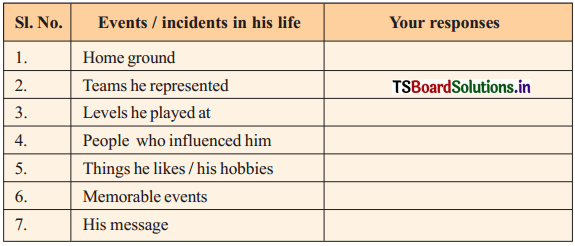
Answer:
| Events/Incidents in his life | Your responses |
| 1. Home ground | Hyderabad. |
| 2. Teams he represented | Hyderabad Cricket Association. |
| 3. Levels he played at | Under 16 and under 19. |
| 4. People who influenced him | His father Dr. V. Shantaram and mother Dr. V Satyabhama. |
| 5. Things he likes/his hobbies | Spending time with his parents and reading biographies of successful people. |
| 6. Memorable events | Scoring 281runs against Australia at Kolkata in 2001. |
| 7. His message | Treat success and failure on the same wavelength. |
![]()
Writing:
Write your views and reflections on V.V.S. Laxman in about 100 – 120 words.
Discuss the following questions in groups before writing ndividually.
- What is the main idea that you wish to project?
- What are the supporting ideas that you think of?
- How do you organize your ideas into paragraphs?
- How do you link your thoughts?
- How do you conclude?
Answer:
Vangipurapu Venkata Sai Laxman
Vangipurapu Venkata Sai Laxman, popularly known as WS Laxman is one of the finest players of the contemporary cricket. He is known for his grace and elegance in batting. His father Dr.V. Shantaram and mother Dr. V.Satyabhama were doctors. His father was his childhood hero. Though he had no sports background, Laxman was guided by their philosophy which taught him to handle success and failure with ease. Since he came from a family of doctors he had a dream to become a doctor. But his parents gave complete freedom to choose his career. His uncle Baba Mohan played a very crucial role in his decision to become a cricketer.
He started his career by playing at the under -16 level. By 18 he was playing in the Ranji Trophy. He has played for 16 years in Indian cricket. He contributed to the best of his ability and helped India become No. 1 Test team.
He had many memorable moments in cricket. He was the member of the No. 1 Test cricket team in the world. He scored 281 against the Aussies in Kolkata in 2001. It was the most memorable match for Laxman as well as for India. This is the series that gave them the confidence to that they Could become the best in the world cricket. Even though he never played in the World Cup he became an outstanding test batsman in the world. He retired from the world cricket when he was 37 giving way for the youngsters to play for India.
![]()
Project Work:
Collect the information from newspapers, magazines, periodicals and books about two famous Indian sportspersons and prepare their profiles.
Fill the details of the following information and you may use them as tips for profile for writing and speaking.
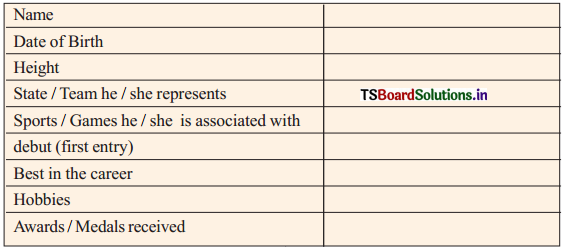
Talk about one profile in the class.
Answer:
Profile – 1: (P.T.Usha)
Name : Pilavullakandi Thekkeparambil Usha
Date of Birth : June 27, 1964
Height : 5.7” (170 cm)
State/Team she represents : National Team – India
Sports/Games she is associated with : Running (Track & Field)
Debut (first entry) : At the age of 16, in 1980 in the Moscow Olympics
Best in the career : At the Asian Meet in Jakarta in 1985 Usha established herself as the Asian sprint queen with five gold medals (in the 100 meters, 200m, 400m, 400m hurdles . and the 4 × 400 m relay) besides a bronze in the 100m relay.
Hobbies : Reading books and listening to music.
Awards/Medals Received:
- Recipient of Arjuna Award, 1984.
- Adjudged as the greatest women athlete, in 1985 Jakarta Asian Athletic Meet.
- Padma Sree in 1984.
- Best Athlete of the year Award from India Government in 1984,/85,/86,/87, and 89. ‘
- In 1986 Seoul Asian Games, won the Adidas Golden Shoe Award for the best athlete by the Asian Amateur Athletics Association, Seoul Asian Games, 1986.
- Asian Amateur Athletics Association, Seoul Asian Games, 1986.
- 33 medals including 13 gold medals in Asian Games and Asian Championships.
- Won a total of 102 medals at National and International meets during her career.
- Won 1 gold and 2 silver at the 1999 SAF Games held at Kathmandu.
- Thirty International Awards, for her excellence in Athletics.
- Kerala Sports Journalists Award for the year 1999.
![]()
Profile with more details:
RT. Usha was bom, as the daughter of Paithal and Lakshmi, at Payyoli, a small village in Kozhikode, on June 27, 1964. Her full name is Pilavullakandi Thekkeparambil Usha. She was the queen of Indian track and field for two decades. RT. Usha has been associated with Indian athletics since 1979. Usha made her international debut at the Moscow Olympics in 1980 but she shone into the limelight in the 1982 Asian Games in New Delhi, winning the silver in the 100 m and 200 m event. At the Asian Meet in Jakarta in 1985 Usha established herself as the Asian sprint queen with five gold medals (in the 100 meters, 200m, 400m, 400m hurdles and the 4 x 400m relay) besides a bronze in the 100m relay.
This magnificent performance was followed by an equally brilliant spell a year later at the Asian Games at Seoul where Usha notched up four golds and a silver medal.
The finest moment in Usha’s career and also perhaps the saddest however came in a single race at the 1984 Olympics in Los Angeles. In the 400m hurdles Usha missed winning the bronze by just l/100th of a second. She recorded her best time of 55.42secs in that race — still an Indian national record — but lost the medal in a photo-finish. Usha said that she cried after the event because “It was difficult to believe that I had missed an Olympic medal by a whisker.”
In 1976 the Kerala State Government started a Sports School for women, and Usha was chosen to represent her district, at a cost of Rs. 250 per month paid by the state. In 1979 she participated in the National School Games, where she was noticed by O. M. Nambiar, who coached her through most of the rest of her career. India Today describes the athletic situation in 1979 as a time when ‘athletics was Very much a male sport and track-suited women a rarity’.
P.T Usha started a School of Athletics to impart training to girl children from all over the country. The School, located at Koyilandi near Kozhikode in Kerala, recruits children in the 10-12 age group for its training.
She likes reading books and listening to music.
Awards and Medals Received:
- Recipient of Aijuna Award, 1984.
- Adjudged as the greatest wonnen athlete, in 1985 Jakarta Asian Athletic Meet
- Padma Sree in 1984.
- Best Athlete of the year Award from India Government in 1984,/85,/86,/87, and 89.
- In 1986 Seoul Asian Games, won the Adidas Golden Shoe Award for the best athlete by the Asian Amateur Athletics Association, Seoul Asian Games, 1986.
- 33 medals including 13 golds in Asian Games and Asian Championships.
- Won a total of 102 medals at National and International meets during her career.
- Won 1 gold and 2 silver at the 1999 SAF Games held at Kathmandu.
- Thirty International Awards, for her excellence in Athletics.
- In recognition of her achieveriients, a road at Payyoli, her home town, is named after her.
- The Kerala Government has also set up a “PT Usha Sports Council” at Central Stadium, Thiruvananthapuram,
- Kerala Sports Journalists Award for the year 1999.
![]()
Profile – 2: (Koneru Humpy)
Name : Koneru Humpy
Date of Birth : 31 March, 1987
Height : 5.6” (165 cm)
State/Team she represents : National – India
Sports/Games she is associated with : Chess
Debut (first entry) : At the age of 8, in 1995 in Indian Under 8 Championship
Best ¡n the career : The second woman in the world with 2606 points in FIDE rating in July 2009.
Hobbies : Reading books and spending with family
Awards/Medals Received:
- Asia’s youngest International Woman Master, 1999.
- World under-14 championship, 2001, Castellan,” Spain.
- India’s youngest Woman Grand Master, 2001.
- World Junior Championship, 2001, Athens.
- World’s youngest Women Grandmaster to achieve full Grand Master status.
- Arjuna Award in the year 2003.
- In 2007, she was awarded with the prestigious Padma Shri award.
- Humpy was also conferred upon the Raja Lakshmi Award in the year 2008 by Raja Lakshmi Foundation of Chennai.
- become the second-highest ranked female player in history with more than 2600 points in FIDE rating in July 2009.
![]()
Profile with more details:
Koneru Humpy is a popular female Indian chess player, and feasibly the best woman at the chess board. She is the world second ranking among the Female Chess Players, stayed behind only by Judit Polgar, who is world number one Female Chess Player.
She was bom on 31st March, 1987 at Gudivada, Andhra Pradesh. Her father is Ashok Koneru worked as a lecturer in Chemistry and he was a quite well chess player. It 1985 he won the South India Open Championship. Humpy fell in love with the game of chess when she was just 5 years of old. In fact, in order to guide her properly and to make sure she gets the best attention for improving her skills as a chess player her father introduced her to the game at quite an early age. The little Humpy showed hejr outstanding performance in chess and she won the Under 8 National Chess Championship in 1995.
After proved her brilliant performance at the National level, Humpy entered the interna-tional chess circle. She clinched the World Chess titles in the Under 10, Under 12 and Under 14 age groups, later, in 1990 Humpy holds an International Master title when she was 12 years. After, she gained her 3rd Grand Master norm in the Elekes Memorial Grand Master Tournament held at Budapest, Hungary.
Konem has set up a world record by getting the International Grand Master title at the age of 15 years old. She broke Judit Polgar record to achieve the feat, and she became the youngest woman ever to have got the coveted title. Further Hou Yifan broke Humpy’s record by taking the title, when she was 14 years. Humpy has been the First Indian Woman to have achieved an International Grand Master title in the chess game.
She likes reading books and spending with her family.
For showing advanced talent as a chess player and making the nation proud at many times at the International level, Humpy has been honoured with a number of awards and recognitions.
Awards & Honours:
- Asia’s youngest International Woman Master, 1999.
- World under-14 championship, 2001, Castellan, Spain.
- India’s youngest Woman Grand Master, 2001.
- World Junior Championship, 2001, Athens.
- World’s youngest Women Grandmaster to achieve full Grand Master status.
- Arjuna Award in the year 2003.
- In 2007, she was awarded with the prestigious Piadma Shri award.
- Humpy was also conferred upon the Raja Lakshmi Award in the year 2008 by Raja Lakshmi Foundation of Chennai.
- At Doha Asian Games 2006, Konem Humpy bagged two Gold Medals in the Individual as well as Team event of Chess.
- In 2007, she won the International Open Chess Tournament 2007 held at Kaupthing, Luxembourg.
- Humpy scored a FIDE Elo rating of 2606 points
- Humpy has broken the world record set by Susan Polgar who had a rating of 2577 points while she was at the World No. 2 spot.
We follow rules while playing sports. We also have ‘Personal Body Safety Rules’ to keep ourselves safe. Thery are:
- Clothing rules : We keep private part covered in front of others. Though we don’t cover our mouth, it is private too.
- Touching rules : We don’t touch private parte in front of others.
- Talking rules : We talk about private parte with Safe Adults.
If someone breaks ‘Personal Body Safety Rules’, I can say ‘No’ to that person; GO away from that person as and when I can; TELL a safe adult about this person because he/she is doing something unsafe and has to be stopped. I am a safe person if I follow Personal Body Safety Rules for myself and for others. I do not touch or talk or behave in an unsafe way with others.
![]()
Self Assessment:
How well have I understood this unit?
Read and tick (✓) in the appropriate box.
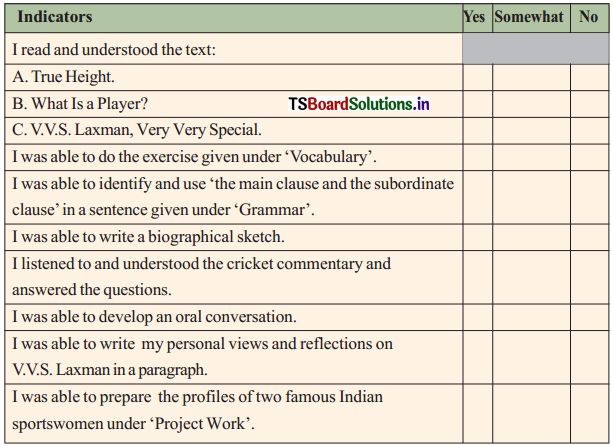
![]()
V.V.S. Laxman, Very Very Special Summary in English
‘Treat success and failure on the same wavelength’
“Success and failure are parts of anybody’s life. The key is self-belief and performing consistently in tough conditions,” VV.S. Laxman tells V. V. Subrahmanyam. One of the finest players in contemporary cricket has called it a day. For someone who delighted cricket lovers with his brilliance with the willow for 16 long years in test cricket, Vangipurapu Venkata Sai Laxman announced his retirement at a crowded media conference in Hyderabad, ahead of the two-test series against New Zealand. The 37-year-old star batsman, who was part of the fabulous batting line-up which helped India become the No. 1 test team, shares his experiences and thoughts . in an exclusive interview with Sportstar.
Vangipurapu Venkata Sai Laxman, popularly known as V.V.S Laxman is one of the finest players of the contemporary cricket. He is known for his grace and elegance in batting. His father Dr.V. Shantaram and mother Dr. V.Satyabhama were doctors. His father was his childhood hero. Though he had no sports background, Laxman was guided by their philosophy which taught him to handle success and failure with ease. Since he came from a family of doctors he had a dream to become a doctor. But his parents gave complete freedom to choose his career. His uncle Baba Mohan played a very crucial role in his decision to become a cricketer.
He started his career by playing at the under -16 level. By 18 he was playing in the Ranji Trophy. He has played for 16 years in Indian cricket. He contributed to the best of his ability and helped India become No. 1 Test team.
He had many memorable moments in cricket. He was the member of the No. 1 Test cricket team in the world. He scored 281 against the Aussies in Kolkata in 2001. It was the most memorable match for Laxman as well as for India. This is the series that gave them the confidence to that they could become the best in the world cricket. Even though he never played in the World Cup he became an outstanding test batsman in the world. He retired from the world cricket when he was 37 giving way for the youngsters to play for India.
![]()
Glossary:
call it a day (idm) : decide or agree to stop doing something, temporarily or permanently
on the verge of (idm) : close to the point where something new begins,
immensely (adv) : to a great extent or extremely
integral (adj) : essential
glare (n) : a focus of public attention
reckoning (n) : recognition/calculation
mindset (n) : attitude/way of thinking
commitment (n) : assurance/dedication
collide (v) : crash
embarrassing (adj) : uncomfortable
cuisine (n) : a style of cooking; food cooked in a certain style
